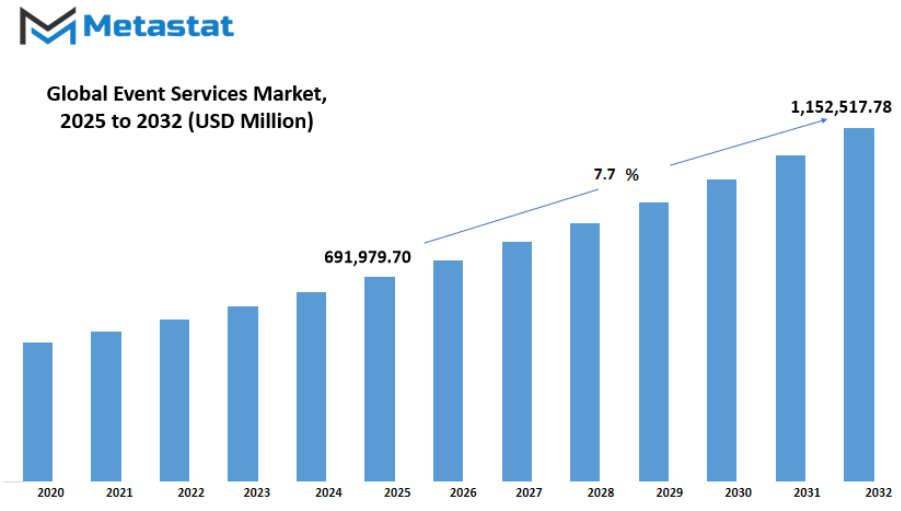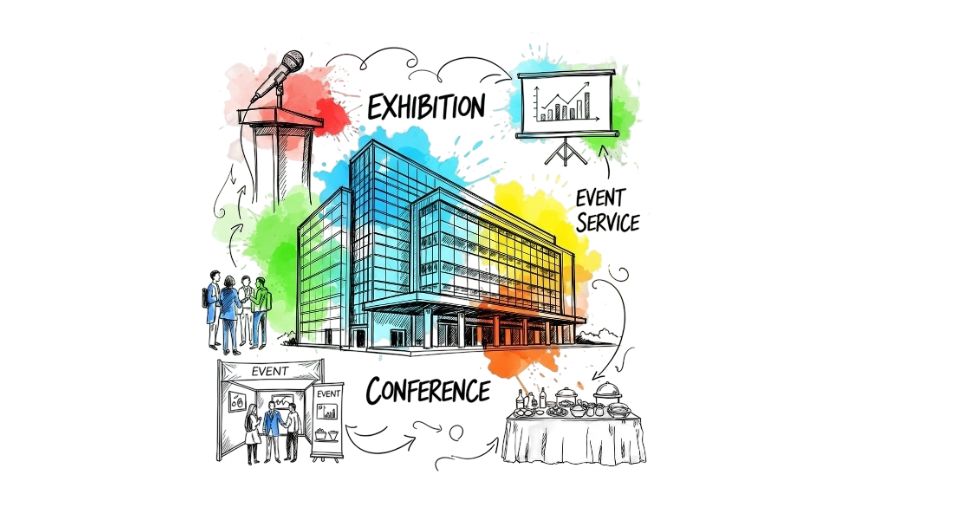MARKET OVERVIEW
The global event services market is a vibrant industry that will engage organizations, manufacturers, and event planners all over the world, combining expertise that consumers will appreciate far into the future. In this industry, teams will establish sites, provide entertainment, provide logistics, and fuel attendee engagement through personalized touchpoints. This division will handle everything from intimate corporate functions to dazzling festivals, and people who work in it will create lasting memories by combining creativity with precise planning.
Years ahead, practitioners in this profession will focus on creating bespoke experiences. Service providers will offer end-to-end solutions from venue booking right through to technical production, design, staffing, and guest services. Hands-on practitioners will utilize physical arrangements along with electronic technologies to design spaces that are interactive and authentic. They will use the sensorial attributes light, sound, touch, and interactive touchpoints to make each assembly emotive and bonding. They will design upscale gala dinners, mass shows, and hybrid models where live elements coalesce with online access, enabling audiences from distant locations to interact effortlessly.
Employees in this industry will be attuned to local sensitivities, traditions, and regulations as well as local logistical considerations like permits, transport, and security. They will work under a variety of regulations and deal with local providers, craftsmen, technical suppliers, and exhibition center managers. Personnel will include coordinators, technicians, designers, and hospitality specialists who will translate ideas into practice and resolve problems diplomatically under duress. At the same time, technology will play the leading part: audio-visual equipment, live streaming, mobile participation platforms, and virtual tours will enable visiting, communicating, and narration.
With the progress of time, members will create diverse models of events immersive exhibitions, theme-based firm outings, charity auctions, and art festivals all tailored to specific audiences. Such an environment will encourage flourishes personalized to the individual: décor attuned to company histories, menus featuring local cuisine, music selections setting mood, and guest experiences designed for surprise and wonder. Production will take rehearsal, scheduling, contingency arrangements, and low-key in-country coordination so that guests feel comfortable and astounded.
Their productions will touch audiences emotionally, whether people are within the walls of a packed auditorium or through an online window. Veteran producers will note plans for hybrid social rituals, culture exhibits, product launches, and enormous convention conferences will increase. Backstage, personnel will work with security, transportation, accommodations, catering, and technical staffs so every element is flawless for guests.
With the future in store, individuals in this profession will be creating sensory events in which everyone involved will feel seen and embraced. Planners will become accustomed to new types of interactivity, virtual enrichment, and personalized touches that will turn gatherings into stories that people will share. The experts will work together with creativity and precision to turn visions into moments that unite communities, deepen identity, and create an enduring fond memory.
Global event services market is estimated to reach $1,152,517.78 Million by 2032; growing at a CAGR of 7.7% from 2025 to 2032.

GROWTH FACTORS
The global event services market will continue to gain attention in the coming years as more industries recognize the value of organized events for growth and engagement. Rapid digital transformation and the rising popularity of hybrid and virtual events are key driving factors of the market. Businesses, brands, and organizations are focusing on creating experiences that connect audiences through both physical and digital platforms, leading to higher demand for specialized event planning, management, and technological support. Increasing investments in advanced event technology, such as artificial intelligence tools, data-driven analytics, and immersive solutions like augmented and virtual reality, will push the market forward at a steady pace.
Another growth factor is the rising need for corporate events, exhibitions, and product launches driven by globalization and business expansion. As companies look to strengthen their presence in different regions, the demand for professional services that ensure seamless event execution will grow rapidly. Additionally, the tourism and hospitality sectors are supporting market development by offering venues, travel assistance, and related services that cater to both small gatherings and large-scale international events.
However, certain factors might hamper market growth. High operational costs and budget limitations often challenge businesses, especially small and medium enterprises, when planning large or complex events. Economic uncertainties and unpredictable external factors, such as global disruptions or political instability, can also slow the pace of market expansion. These elements may limit the ability of service providers to secure consistent contracts or adapt quickly to changing demands.
Despite these challenges, technological advancements and rising consumer expectations would provide lucrative opportunities for the market in the coming years. The integration of automation, AI-driven platforms, and real-time analytics will allow event organizers to deliver highly personalized experiences, improving audience engagement and client satisfaction. The adoption of sustainable event solutions is another area that will generate growth, as businesses and organizations focus on reducing environmental impact while maintaining quality and efficiency.
Looking ahead, the global event services market will likely see steady innovation and expansion. Increased partnerships between event organizers, technology providers, and corporate clients will help create customized solutions that cater to diverse industries. The ongoing shift toward hybrid models, where in-person and virtual experiences merge, will redefine event planning strategies and broaden the reach of events worldwide. As businesses continue to prioritize strong audience connections and data-driven strategies, the demand for advanced, reliable, and creative event services will remain strong, shaping a future where efficiency and innovation work together to drive growth.
MARKET SEGMENTATION
By Type
The global event services market will continue to grow as industries and organizations place stronger importance on experiences that connect people and brands. The market is driven by rising demand for professional services that ensure events are organized efficiently, attract the right audience, and deliver measurable results. Companies, institutions, and agencies will keep investing in solutions that create well-structured and memorable events, not only for promotional purposes but also for education, networking, and business expansion.
By type, the global event services market is segmented into several key areas. Event planning will remain one of the most critical segments, focusing on designing and coordinating every detail to match the goals of each occasion. Event management will gain more relevance, offering end-to-end control that includes budgeting, staffing, scheduling, and execution. Exhibition management will expand as trade shows and industry expos continue to be an effective way to showcase products, build relationships, and secure partnerships. Sponsorship management will also experience growth, with businesses increasingly recognizing the value of strategic collaborations to enhance visibility and credibility during events.
Venue management within the global event services market will see technological advancements, such as digital booking systems and real-time availability platforms, allowing smoother operations. Equipment rental services will stay in demand as events of all sizes require audio-visual systems, lighting, and staging equipment for seamless presentations and performances. Catering services will evolve, with more emphasis on customization, dietary needs, and sustainability to enhance the attendee experience. Other specialized services, including branding solutions, digital engagement platforms, and security management, will support the diverse requirements of modern events.
The future of the global event services market will be shaped by innovation and technology integration. Virtual and hybrid event formats will keep playing an important role, offering flexibility and broader audience reach. Data-driven strategies will allow organizers to measure engagement levels and improve future planning. Sustainability will be a significant factor, pushing service providers to adopt eco-friendly practices such as waste reduction, energy-efficient equipment, and digital ticketing solutions.
Growth in emerging markets will present new opportunities, as businesses and communities in developing regions increasingly seek professional event solutions. The need for creative experiences will drive demand for skilled providers who can combine innovation with precise execution. As industries evolve, the global event services market will adapt, offering a mix of traditional approaches and advanced tools to deliver meaningful, high-impact experiences for audiences worldwide.
By Event Type
The global event services market will continue to grow as demand for live experiences and organized gatherings expands across industries. Rapid urban development, rising disposable incomes, and digital advancements will shape the way events are planned, managed, and delivered. By event type, the market is divided into music concerts, festivals, sports, exhibitions and conferences, corporate events and seminars, and other specialized occasions, each contributing uniquely to this growth.
Music concerts and festivals will attract massive audiences, driven by the popularity of live performances and innovative event technologies. Enhanced stage designs, immersive visual effects, and the use of AI for audience engagement will make these events more interactive and memorable. The global event services market will benefit from the continued blending of physical and digital experiences, with hybrid models allowing audiences worldwide to join through streaming platforms.
Sports events will remain a powerful segment, as global tournaments, local leagues, and community-based competitions generate demand for venue management, ticketing, and hospitality services. Advancements in virtual reality and augmented reality will allow fans to experience matches from unique perspectives, creating new revenue opportunities for event organizers.
Exhibitions and conferences will adapt to modern business needs, focusing on advanced networking tools and data-driven matchmaking to connect participants more effectively. Industries will rely on these platforms to launch products, share knowledge, and form partnerships, fueling demand for more innovative and flexible event services. The global event services market will witness increased integration of digital solutions, reducing operational costs and enhancing attendee satisfaction.
Corporate events and seminars will evolve with a stronger emphasis on personalization and sustainability. Companies will invest in interactive sessions, eco-friendly venues, and virtual platforms to engage employees and clients more effectively. Demand for professional event planning and management will rise as businesses seek high-quality execution and measurable returns on investment.
Other event types, such as social celebrations, cultural gatherings, and charitable functions, will also drive market expansion. Customized event experiences, combined with smart technologies, will allow organizers to cater to diverse audiences with unique preferences.
Looking ahead, the global event services market will be shaped by data analytics, AI-driven personalization, and sustainable practices. Demand for scalable and technology-enabled solutions will rise as organizations and individuals look for seamless planning, execution, and post-event analysis. As digital transformation accelerates, event services will focus on creating meaningful, efficient, and accessible experiences that cater to both in-person and virtual attendees, ensuring consistent growth and innovation in the years to come.
By Organization
The global event services market will draw a future image of organizing gathering opportunities that will reach across all corners. In that future, planning will shift toward blending emerging technology and personal needs. That means production will include virtual stages that feel alive and real, with systems that connect people anywhere without delay or loss. Such systems will adjust on their own, putting value first and cutting waste. Trust in seamless connection will grow as tools learn patterns and keep experiences smooth. A sense of excitement will build as time passes.
That market will shape how organizations host gatherings. Small and medium enterprises will gain access to tools that offer big ideas on tight budget. Tools will scale up or down based on demand, making creative showrooms or hybrid meetings easy to organize with minimal staff. Large enterprises will tap into power to host events that look polished. Automation will craft agendas, manage invites and follow-ups, and oversee logistics in a smart way. Large efforts will run almost on their own, freeing staff to focus on content, tone, and personal touch. Government bodies will turn toward public programs that reach many people while staying safe and inclusive. Platforms will monitor attendance, feedback, and trust. That will make public gatherings feel personal and secure at same time. NGOs will lean into storytelling that matters. That will open space for shared causes and real change. Tools will help track impact and keep supporters engaged.
That future picture holds a shift. Cost will drop as technology becomes more accessible. That will expand who can plan and host events. Small groups will look like big ones. Planning will feel lighter, more flexible, more exciting. Rich visuals will bloom on screens and in physical spaces. Coordination will happen with a few taps, with data guiding each choice. Decision-makers will see what attendees enjoy most while events proceed. That will let planners tweak sessions on the fly, raising satisfaction.
That will reshape expectations. Event hosts will become storytellers and guides. Audience members will feel heard and seen. That creates a circle where every voice matters and every moment counts. Future of gatherings will rest on balance between smart systems and thoughtful people. Work will come together smoothly, and every event will echo with meaning. Growing technology will make gatherings richer and more human at once. global event services market will make that possible by helping every type of group share ideas, arts, and dreams.
By End User
The global event services market is expected to witness consistent growth in the coming years as businesses, institutions, and organizations continue to recognize the value of structured and well-managed events. By end user, the global event services market is divided into corporate, sports, education, entertainment, and other sectors, each contributing uniquely to the demand for innovative and tailored solutions. This steady expansion will be fueled by the increasing need for organized experiences that foster connection, engagement, and brand visibility across different industries.
The corporate sector will remain one of the strongest drivers of the global event services market. With companies hosting meetings, conferences, and large-scale gatherings to build networks and share knowledge, demand for professional event planning and execution will continue to rise. The integration of advanced technology, including virtual and hybrid event solutions, will also shape how businesses engage with employees, stakeholders, and customers in more interactive and efficient ways.
Sports events will also play a major role in shaping future demand within the global market. From international tournaments to local leagues, sports events require extensive planning, crowd management, sponsorship coordination, and media coverage. Growing investments in sports infrastructure and the popularity of global sporting events will create opportunities for service providers to deliver specialized and innovative experiences.
The education sector is another area where steady demand for event services will grow. Institutions will increasingly rely on professional management for academic conferences, training programs, and student-focused activities. As education becomes more global, the need for seamless execution of cross-border academic events and digital learning platforms will strengthen the market's outlook in this segment.
Entertainment will continue to represent one of the most dynamic areas of the global market. Concerts, festivals, and cultural gatherings will call for advanced production techniques, immersive experiences, and creative event design. Rapid adoption of technologies such as augmented and virtual reality will enhance audience engagement, creating an even stronger need for skilled service providers capable of managing complex event environments.
Other sectors, including non-profit organizations, government initiatives, and social gatherings, will further contribute to growth. These events, whether small-scale or large public occasions, will drive consistent demand for well-organized planning, innovative concepts, and smooth execution.
The future of the global event services market will be shaped by evolving consumer expectations, digital transformation, and the desire for unique, personalized experiences. As industries adapt to changing preferences and technological advancements, service providers will focus on creativity, efficiency, and flexibility to meet diverse requirements while ensuring quality and reliability in every event delivered.
|
Forecast Period |
2025-2032 |
|
Market Size in 2025 |
$691,979.70 million |
|
Market Size by 2032 |
$1,152,517.78 Million |
|
Growth Rate from 2025 to 2032 |
7.7% |
|
Base Year |
2024 |
|
Regions Covered |
North America, Europe, Asia-Pacific Green, South America, Middle East & Africa |
REGIONAL ANALYSIS
The global event services market is gaining remarkable momentum as industries, corporations, and organizations increasingly recognize the importance of professional event management. With advancements in technology and a growing demand for unique experiences, the sector is expected to witness steady growth in the coming years. Rapid urbanization and rising disposable income are also driving more interest in organized events, from corporate conferences and exhibitions to cultural festivals and private celebrations. As industries adapt to changing preferences, the focus will be on efficiency, innovation, and digital integration to create more personalized and seamless event experiences.
Based on geography, the global event services market is segmented into North America, Europe, Asia-Pacific, South America, and the Middle East & Africa. North America, which includes the U.S., Canada, and Mexico, continues to lead due to strong corporate activity, innovative event technologies, and high consumer spending on both business and leisure events. The region’s established infrastructure and growing investments in hybrid and virtual events will further shape future growth. Europe, which includes the UK, Germany, France, Italy, and the Rest of Europe, is showing consistent expansion fueled by cultural tourism, international trade shows, and advancements in digital solutions tailored for event planning.
The Asia-Pacific region, segmented into India, China, Japan, South Korea, and the Rest of Asia-Pacific, is experiencing the fastest growth. Rising populations, rapid economic development, and increased investments in smart event technologies are transforming the region into a key hub for event management services. From large-scale corporate functions to entertainment-driven gatherings, this region will likely continue to drive significant revenue for the global event services market. South America, with Brazil, Argentina, and the Rest of South America, is witnessing growth led by sports, cultural events, and government-supported initiatives to boost tourism through event-driven strategies.
In the Middle East & Africa, which includes GCC Countries, Egypt, South Africa, and the Rest of the region, the market is expanding as countries invest heavily in infrastructure and global exhibitions to attract international businesses and tourists. Mega projects and international expos in these regions will continue to create opportunities for advanced event services and specialized solutions.
Future growth in the global event services market will be shaped by technology, sustainability, and the demand for more engaging, interactive experiences. Automation, data-driven insights, and eco-friendly event planning will become core strategies for businesses aiming to meet evolving client expectations while maintaining operational efficiency. As digital tools and artificial intelligence reshape event execution, the market will continue to position itself as a vital driver of economic and cultural connections worldwide.

COMPETITIVE PLAYERS
The global event services market shows bright opportunities ahead. A vision that stretches beyond current patterns offers a look at how the global market will shift during the next decade. Growth will hinge on creativity, technology, and adaptability. As the world becomes more connected, demand for immersive experiences will rise. Companies that understand emerging needs and respond quickly will set the pace.
Competition will sharpen among familiar names and fresh contenders. Freeman already stands strong with a global presence and a reputation for delivering customized environments. Intelligent Protection International Limited brings security and planning expertise, which will become even more important as safety expectations increase. ATPI Ltd offers travel and event logistics in one package, easing the burden for organizers who will want streamlined solutions. GL Events brings venue management and event production together, offering efficiency that will appeal in tightly scheduled scenarios. BCD Group will continue to integrate travel management into event planning in creative ways.
Bishop-McCann excels in immersive design. Clarion Events Ltd. stands out with a portfolio that spans exhibitions and conferences around the world. TAG Group has a strong foothold in integrated venue and event operations. Messe Frankfurt GmbH operates massive trade fairs and will benefit from expanding hybrid formats. Viad Corp (GES) brings experience in large-scale exhibitions and will adapt as digital elements weave into live setups. dmg events will build on niche event expertise to supply tailored services. Givergy will strengthen interactive offerings and fundraising components, especially where virtual participation links with live gatherings. Jack Morton Worldwide focuses on brand experience and will lead in personalized attendee engagement. George P. Johnson Experience Marketing emphasizes storytelling and will shape first-class attendee journeys. Encore Global delivers audiovisual and staging support, which will grow more in demand. Eventbrite will enhance accessibility by simplifying ticketing for hybrid and online components. Tigris Events Inc. will step forward with mobile solutions that meet next-generation attendees. Stronco Group will heighten catering and event food services, adapting menus to health trends and tech-enabled ordering. 10tation Event Catering will emphasize design-led hospitality experiences. The Idea Hunter returns creative event concepting to the center of planning. The Look Company offers installation and design services that embellish event environments.
Each company plays a unique part. Those that integrate technology, personalize attendee journeys, and anticipate shifting needs will shape what the global event services market becomes. Innovations in virtual engagement, sustainability, and data-driven design will transform how gatherings unfold. Strategic vision and nimble execution will define success in this competitive landscape.
Event Services Market Key Segments:
By Type
- Event Planning
- Event Management
- Exhibition Management
- Sponsorship Management
- Venue Management
- Equipment Rental
- Catering Services
- Other
By Event Type
- Music Concert
- Festivals
- Sports
- Exhibitions and Conferences
- Corporate Events and Seminars
- Other
By Organization
- Small and Medium Enterprises
- Large Enterprises
- Government Bodies and NGOs
By End User
- Corporate
- Sports
- Education
- Entertainment
- Other
Key Global Event Services Industry Players
- Freeman
- Intelligent Protection International Limited
- ATPI Ltd
- GL Events
- BCD Group
- Bishop-McCann
- Clarion Events Ltd.
- TAG Group
- Messe Frankfurt GmbH
- Viad Corp (GES)
- dmg events
- Givergy
- Jack Morton Worldwide
- George P. Johnson Experience Marketing
- Encore Global
- Eventbrite
- Tigris Events Inc.
- Stronco Group
- 10tation Event Catering
- The Idea Hunter
- The Look Company
WHAT REPORT PROVIDES
- Full in-depth analysis of the parent Industry
- Important changes in market and its dynamics
- Segmentation details of the market
- Former, on-going, and projected market analysis in terms of volume and value
- Assessment of niche industry developments
- Market share analysis
- Key strategies of major players
- Emerging segments and regional growth potential








 US: +1 3023308252
US: +1 3023308252






